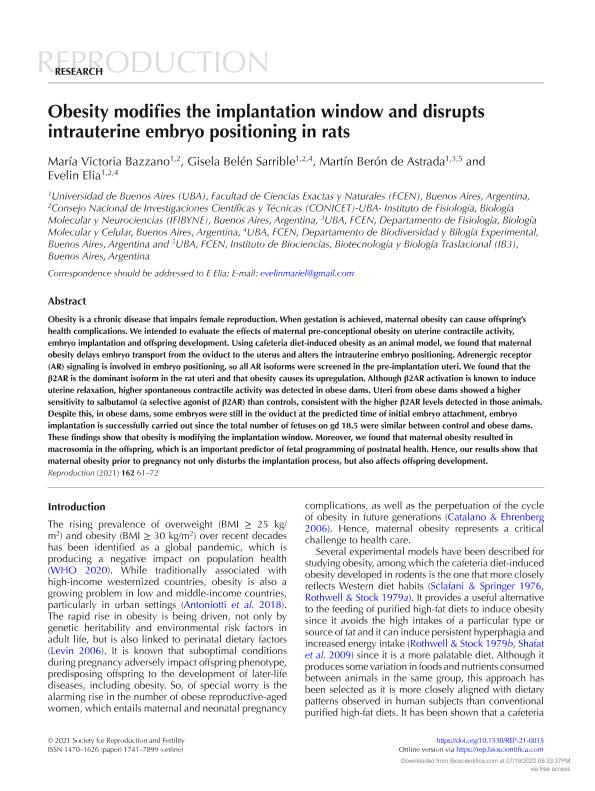Artículo
Obesity modifies the implantation window and disrupts intrauterine embryo positioning in rats
Fecha de publicación:
05/2021
Editorial:
BioScientifica
Revista:
Reproduction
ISSN:
1470-1626
Idioma:
Inglés
Tipo de recurso:
Artículo publicado
Clasificación temática:
Resumen
Obesity is a chronic disease that impairs female reproduction. When gestation is achieved, maternal obesity can cause offspring’s health complications. We intended to evaluate the effects of maternal pre-conceptional obesity on uterine contractile activity, embryo implantation and offspring development. Using cafeteria diet-induced obesity as an animal model, we found that maternal obesity delays embryo transport from the oviduct to the uterus and alters the intrauterine embryo positioning. Adrenergic receptor (AR) signaling is involved in embryo positioning, so all AR isoforms were screened in the pre-implantation uteri. We found that the β2AR is the dominant isoform in the rat uteri and that obesity causes its upregulation. Although β2AR activation is known to induce uterine relaxation, higher spontaneous contractile activity was detected in obese dams. Uteri from obese dams showed a higher sensitivity to salbutamol (a selective agonist of β2AR) than controls, consistent with the higher β2AR levels detected in those animals. Despite this, in obese dams, some embryos were still in the oviduct at the predicted time of initial embryo attachment, embryo implantation is successfully carried out since the total number of fetuses on gd 18.5 were similar between control and obese dams. These findings show that obesity is modifying the implantation window. Moreover, we found that maternal obesity resulted in macrosomia in the offspring, which is an important predictor of fetal programming of postnatal health. Hence, our results show that maternal obesity prior to pregnancy not only disturbs the implantation process, but also affects offspring development.
Palabras clave:
Muscle control
,
Smooth muscle
,
Force
,
Obesity
Archivos asociados
Licencia
Identificadores
Colecciones
Articulos(IFIBYNE)
Articulos de INST.DE FISIOL., BIOL.MOLECULAR Y NEUROCIENCIAS
Articulos de INST.DE FISIOL., BIOL.MOLECULAR Y NEUROCIENCIAS
Articulos(OCA CIUDAD UNIVERSITARIA)
Articulos de OFICINA DE COORDINACION ADMINISTRATIVA CIUDAD UNIVERSITARIA
Articulos de OFICINA DE COORDINACION ADMINISTRATIVA CIUDAD UNIVERSITARIA
Citación
Bazzano, María Victoria; Sarrible, Gisela Belén; Berón de Astrada, Martín; Elia, Evelin Mariel; Obesity modifies the implantation window and disrupts intrauterine embryo positioning in rats; BioScientifica; Reproduction; 162; 1; 5-2021; 61-72
Compartir
Altmétricas




